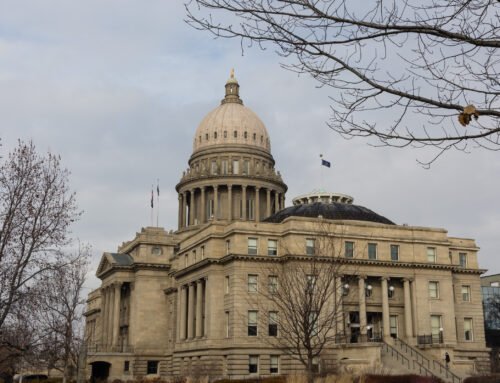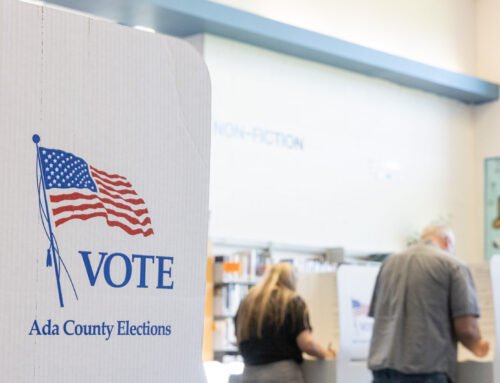One of state superintendent Debbie Critchfield’s top priorities is preparing graduates for in-demand technical jobs.
So she pushed legislation that will pump $45 million tax dollars in a program designed to generate training programs in rural Idaho.
So far, her plan is working.
About 73% of the grant applications aimed at boosting career technical education (CTE) programs have come from remote areas, like Potlatch, Firth and Murtaugh.
That’s where the state superintendent hoped these grant funds would have an impact. “This program positions Idahoans to create workforce solutions that are responsive and tailor-made for their area’s individual needs,” Critchfield wrote in a recent press release.
The state’s $45 million Idaho Career Ready Students (ICRS) Program aims to meet the workforce needs of rural communities, although any school is eligible to apply. The career technical education initiative for grades 8-12 began accepting grant applications in July.
High school CTE programs prepare Idaho’s youth for high-skill, in-demand careers. There are six pathways:
- Agriculture, food and natural resources.
- Business and marketing education.
- Engineering and technology education.
- Family and consumer sciences, and human services.
- Health professions and public safety.
- And trades and industry.
Since the application period opened, $22.5 million dollars of requests have reached the state, which is about half the funds allocated. There is no set application deadline, so project requests are being accepted.
The 11-member ICRS council will be making funding decisions on Sept. 6, then quarterly to review applications.
Twenty-five out of the current 34 applications came from a rural school. Portneuf Valley Technical Education and Career Campus in Chubbuck has the largest request and Aberdeen High School made the smallest.
In terms of total dollars, the following three applications were the largest submitted. All three involve construction or renovation projects.
- $6.5 million — Pocatello Chubbuck School District: Portneuf Valley Technical Education and Career Campus plans to complete the remodel of the existing 78,000 square foot Allstate building and add 20,000 additional square feet to the east side of the building to house welding, construction, and firefighting. When the building is fully open, there will be 22 classrooms and three shops. This project will both expand existing programs and add new programs.
- $6 million — Minidoka School District: Minico High School’s project is to construct an agriculture science and welding building to boost ag sciences, welding, manufacturing, engineering, construction and mechanics classes. Welding has 300 students requesting classes each year, but a 180-student capacity. Minico’s Future Farmers of America chapter is the largest in Idaho and 1,100 students select an ag class as their first elective choice. Community donations have topped $750,00 and two local companies have committed to providing a $200,000 overhead hoist system.
- $5 million — West Ada School District: Owyhee High School plans to expand and modernize its CTE programs in construction and welding fabrication. Through a partnership with the ICRS grant money and industry support, they will leverage a 40,000 square foot $1.8 million building donation (which is adjacent to the high school) to expand and revolutionize the educational infrastructure. This venture will reduce the number of students turned away from ongoing programs, create homes for homeless veterans and drive economic growth.
The following three applications were the smallest submitted. Each helps students acquire useful skills for the workplace.
- $32,000 — Marsh Valley School District: Marsh Valley High School plans to expand its existing welding program with the purchase of six TIG welding systems. In the Marsh Valley area, qualified welders are needed for agricultural, commercial and government positions. This program will increase the number of prepared candidates for these positions.
- $6,000 — Hansen School District: Hansen Junior/Senior High School plans to purchase equipment for a good science lab and food equipment to learn industry standards. Students will learn the operation and science behind food production. Over 15,000 jobs in the Magic Valley are in food processing, food science research and development.
- $5,500 — Aberdeen School District: Aberdeen High School plans to open a student store, offering an on-site location to replenish supplies. Running the store will provide real-world experience with business operations, marketing, inventory, cash exchanges and sales. The money will be used to acquire equipment and merchandise.
Examples of acceptable expenses in this grant program include capital costs needed to upgrade and expand existing programs or construction costs associated with building programs, like architectural and design fees; and investments to develop programs specific to a local region and job market.
School districts and charters can apply for the funds here. The ICRS program was approved by the Legislature earlier this year and signed into law by Gov. Brad Little on March 31.






Leave A Comment